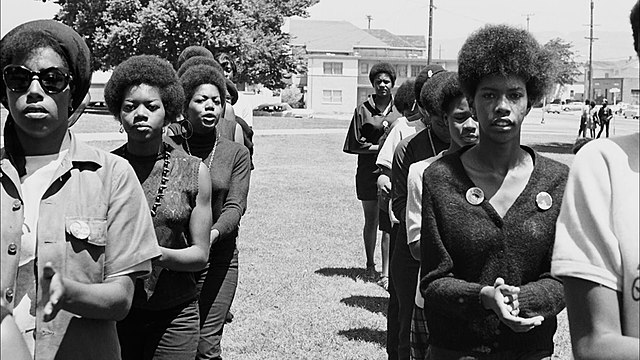In 1968, the Black Panther Party introduced its free breakfast program, which within a year feed 20,000 in 19 cities. This was one of 65 “survival programs” created by the party- with the slogan “survival pending revolution”. Other programs included children’s development centres, schools and adult education, free food/clothing, health clinics (with an ambulance service), free cooperative housing, free buses to prisons, and self-defence for retirees. These solidarity economy programs helped oppressed peoples meet their basic needs, and instead of being ashamed about not being able to feed themselves, people built a shared analysis about poverty and racism, breaking down isolation and making them able to work together for change.
Recognising the success of the programs, in 1969 the FBIs director wrote “the BCP [Breakfast for Children Program] represents the best and most influential activity going for the BPP [Black Panther Party] and, as such, is potentially the greatest threat to efforts by authorities to neutralise the BPP and destroy what it stands for”
At its peak the party reportedly had 90% support amongst black people in major cities and sold ¼ million copies of its newspaper each week. Therefore, the government brutally supressed the panthers, both with killings, and more subtly: to neutralise the Panthers, the government expanded the federal free breakfast program (which still feeds millions today)
Seniors Against a Fearful Environment (SAFE)
“SAFE was a non-profit organisation organised by the Black Panthers. A group of senior residents asked the Black Panthers to launch the organisation to help seniors learn self-defense techniques to prevent robberies, muggings and other attacks on seniors. These seniors had originally approached the Oakland police department to provide additional patrols and protection. The SAFE program offered free transportation services which allowed seniors to conduct banking transactions more safely” – Community Services Programs Provided by The Black Panther Party
Free Food Program
“The intent of the Free Food Program was to supplement the groceries of Black and poor people until economic conditions allowed them to purchase good food at reasonable prices, according to Hilliard. The Free Food Program provided two basic services to the community: 1. An ongoing supply of food to meet their daily needs. 2. Periodic mass distributions of food to reach a larger segment of the community than could be serviced from the ongoing supply. The community was provided with bags of fresh food containing items such as eggs, canned fruits and vegetables, chickens, milk, potatoes, rice, bread, cereal, and so forth. A minimum of a week’s supply of food was included in each bag” – 8 Black Panther Party Programs That Were More Empowering Than Federal Government Programs.
Free Healthcare
“One of the contributions of the Party less-talked about in popular discourse, is its organising and work around health care. The Panthers fought to protect blacks and other marginalised populations from dangerous medical research like UCLA’s plan to establish the Center for the Study and Reduction of Violence that wanted to test inner-city children and other vulnerable groups for supposed genetic and biological predisposition to violence. The Party also established health care clinics for Black people in the community and worked to raise awareness about sickle cell anemia, a genetic disease that predominantly affects people of African descent.” – A Conversation With Prof. Alondra Nelson on the Black Panther Party’s Fight for Health Care
“In November of 1970, the Black Panther Party and the Young Lords seized a section of Lincoln Hospital, establishing the first drug detox program in the South Bronx, the center of the city’s heroin epidemic. The “People’s Detox” operated out of the old nurses’ residence under a coalition of Black and Puerto Rican left nationalists, socialists, and radical medical workers. Influenced by the psychological work of Frantz Fanon, they saw revolutionary political education as essential for overcoming drug addiction” – Junkie Communism
Further Resources
Black Panthers in the 1960s: a rare intimate look – in pictures – An exhibition at the San Francisco Art Institute takes a new look at Pirkle Jones and Ruth-Marion Baruch’s controversial 1968 photo essay, which sought to enhance public understanding of the Black Panthers.
“With contemporary audio interviews from leading African American artists, activists, musicians and scholars, The Black Power Mixtape 1967-1975 looks at the people, society, culture, and style that fuelled an era of convulsive change. Utilising an innovative format that riffs on the popular 1970s mixtape format, Mixtape is a cinematic and musical journey into the black communities of America.”
